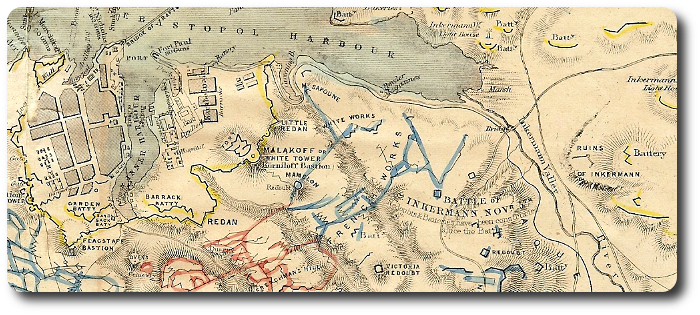Topic: Military Theory

Fieldworks (1855)
In the seige of the Peninsular war, next to the sappers, the guards, we are told, were found to be the best workmen; and this is the character they bear at Sebastopol.
From: Field Service; The Sydney Morning Herald, Sydney, Australia, 11 May 1855
(From the Household Words)
From fire we pass to ice, to mention a recipe for improving the passage across a frozen river. When ice is thick enough to bear a man, lay six inches of straw down, and pour water on it; and when the whole mass has frozen together, lay down planks, and it will be strong enough to bear a train of field artillery. Great caution is used in passing a pontoon bridge, as well as a suspension bridge; and, to counter-act the dangerous rocking to which there is a tendency, the troops should never keep step, or halt upon it, unless it has begun to rock. In swimming a horse, give him his head; and, if he is distressed throw yourself off and hold on by the mane, or the tail; for he cannot kick in the water. But, as he swims nearly upright, the mane is more convenient.
Temporary works in the field are hastily raised to afford protection to the camp, and to enable the troops to annoy the enemy more effectually. The main features are a parapet breast high, for a screen; and a ditch or trench outside. The cubical contents of these two are about equal; so that what is thrown out of the trench just serves to make the parapet; as in planning a railway, the great art of the engineer is to lay his line at a such inclinations, that the stuff taken from the cuttings shall suffice to form the embankments. One to two cubic yards per hour is the allowance for each soldier, who under these circumstances works without additional pay; the use of the spade, pickaxe, and barrow being as essential for the defensive, as that of the musket and bayonet for the offensive operations of the army. An exception is however justly made for the performance of certain duties at sages—say, the siege of Sebastopol—and in special cases. Where the soil is unfavourable, or time forbids its use, artificial parapets are raised with piles of gabions, fascines, and sandbags. To obstruct the enemy, sharp palisades are stuck in the ground here and there; and abatis, or small trees in the rough state, are dispersed in all directions.
The fascine is a large faggot, the full size of which is eighteen feet, and the weight one hundred and forty pound; the gabion is a coarse basket, a foot and three-quarters high, weighing when filled forty pounds. Along with tarred sandbags, these are used in immense quantities to build up the extempore walls of batteries, made on the same principle as field-works. It is the proper business of the sappers and miners of the engineer department to construct such batteries, and it is usually performed in the night-time, that the men may be less exposed to the enemy's fire. Working parties are at the rate of eleven to fourteen per gun, assisted by volunteers from the rest of the army. In the seige of the Peninsular war, next to the sappers, the guards, we are told, were found to be the best workmen; and this is the character they bear at Sebastopol. Such is the zeal of their officers, that they do not disdain to act the part of foremen over their men, under the direction of the engineers.

